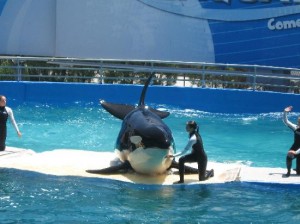Making the Case
A New Beginning for DolphinsPart Three of “Dolphins and Us” A New Beginning for Dolphins Freeing Lolita Could Tilikum Also Be Set Free? Making the Case Is SeaWorld on the Ropes? In the World Spotlight SeaWorld Testifies before Congress Dolfinlandia How You Can Help Interviews & Reports The Case for Dolphin Rights When the Watchdog is Just a Guard Dog Communion in the Wild SEE ALSO: |
 Steven Wise isn’t banking on the milk of human kindness suddenly flowing from the Miami Seaquarium or SeaWorld.
Steven Wise isn’t banking on the milk of human kindness suddenly flowing from the Miami Seaquarium or SeaWorld.
As an attorney, professor of law, author and historian, Wise has spent most of his professional life gearing up for the lawsuit he’s preparing to launch on behalf of certain “Class One” animals, who, he argues, satisfy all the generally-accepted definitions that are used in legal cases to define a “person.”
What’s a person?
Being a “person” is not legally the same thing as being a “human.” A person has certain rights and obligations no matter whether you are a human or a nonhuman person. (Courts have even established that corporations qualify as “persons” in certain respects and are entitled to related rights.)
In general, personhood is not defined by the fact that you’re human; it’s defined by your level of consciousness and self-awareness. A “person” has a certain level of individual, self-aware consciousness that entitles them to special treatment. A person cannot be owned by another person, cannot be bought or sold, cannot be treated like a chair or a table. A person has certain legal rights.
When the Founding Fathers wrote that “all men are created equal … with certain unalienable rights,” they were not including all humans – just the ones who, in their terms, qualified as “persons”. There were other humans who, in their consideration, did not have the legal right to life, liberty and the pursuit of happiness.
It took centuries of legislation, war and cultural evolution for our society to accept others of our own kind as persons. And those questions are still the subject of heavy debate: Is an unborn baby a person? i.e. Does he or she have the right to life? What about an adult in a persistent vegetative state?
And what about a non-human with the same level of individual, self-aware consciousness that would qualify a human for certain ethical treatment? What if you can prove that certain non-human animals have a level of consciousness and self-awareness that meets – or, indeed, exceeds – the average human?
Across the country, a team of legal beagles, working with Steven Wise, is preparing to bring the first formal litigation that would lead to a high court in one of the 50 states declaring that a non-human should be accorded certain carefully defined rights.
One small precedent for a single animal – one huge step for all animal-kind!
 Right now, as part of the meticulous research that’s going into The Non-Human Rights Project, Steven Wise’s team is determining who that one non-human captive animal will be. It may be a great ape; it may be a whale or dolphin. And it could very well be Lolita, the 40-year-old orca who has spent her life in captivity, entertaining humans at the Miami Seaquarium.
Right now, as part of the meticulous research that’s going into The Non-Human Rights Project, Steven Wise’s team is determining who that one non-human captive animal will be. It may be a great ape; it may be a whale or dolphin. And it could very well be Lolita, the 40-year-old orca who has spent her life in captivity, entertaining humans at the Miami Seaquarium.
Here’s some of what the legal team is currently doing:
*Their legal group is sifting through tens of thousands of pages of case law.
*Their sociological group is looking at everything that’s understood about how judges make decisions. “We have people who have PhD’s in psychology, sociology, political science working on that.”
*Their “super-crunchers working group” is developing algorithms that will help them better understand how judges are ruling on cases, what factors are taken into consideration – “perhaps even better than they understand it themselves.”
*And since they can only file suit in a state where a great ape or dolphin is being held in captivity, they’re ranking the various possible states to determine where they have the best chance.
“Right now,” says Wise, “we have 26 researchers scattered around the United States and we’re hoping to file that suit probably in 2011.”
Wise’s preparation has been meticulous. The research he’s been doing for 20 years has led to several books, the last of which, Drawing the Line, sets out the case that “Class One” animals, who include dolphins, whales and chimpanzees – all of whom share certain characteristics of “personhood” – have the right to a certain level of legal protection.
“When it comes to Class One animals,” he explains, “you need to stop violating their bodily integrity and bodily liberty immediately. The evidence is really overwhelming that they are the kind of creatures we would recognize should not be treated in this manner. And they should be legal persons, at least to some extent.”
Wise is against all cruelty to animals, but he’s not just promoting legislation against cruelty to animals; the case he’s putting together will be a precedent-setting lawsuit, carefully framed around the personhood of one particular animal – quite possibly Lolita.
Read our interview with Steven Wise where he explains how his case is being put together.
And here’s a fuller explanation of “personhood” by business ethics professor Tom White, author of In Defense of Dolphins.
